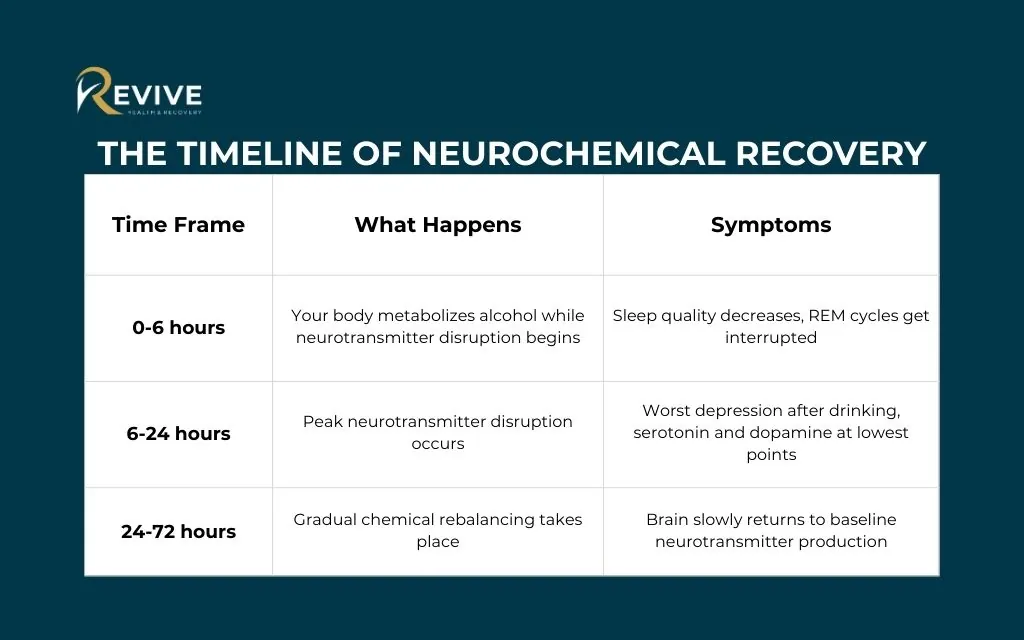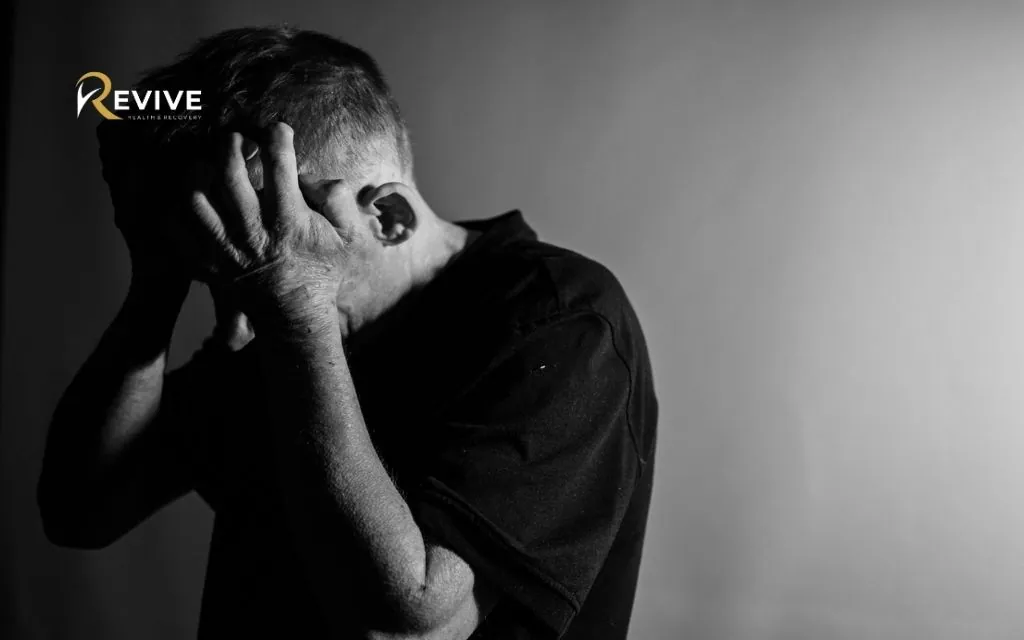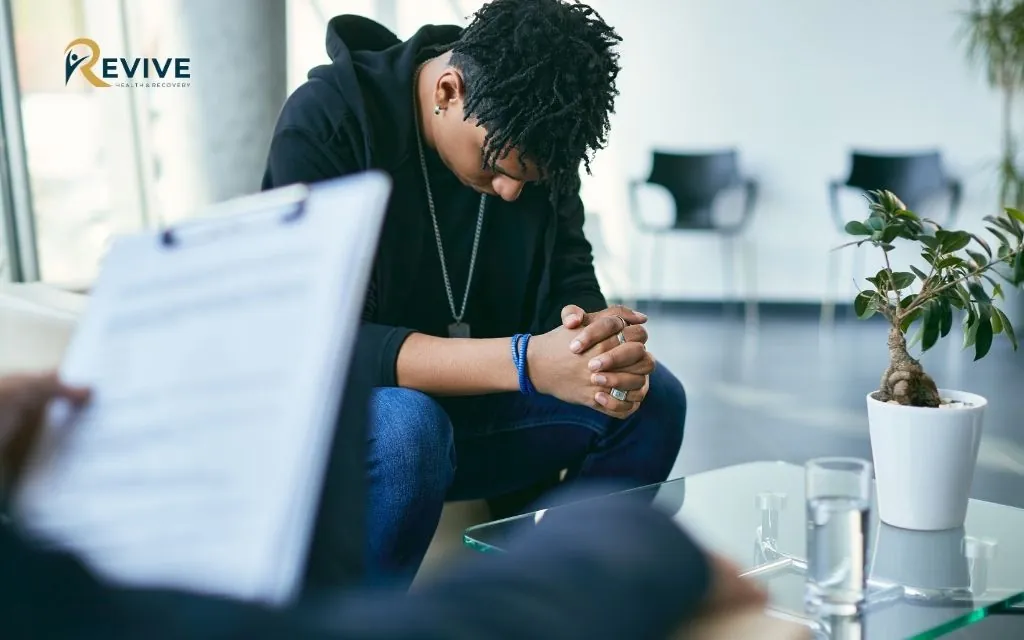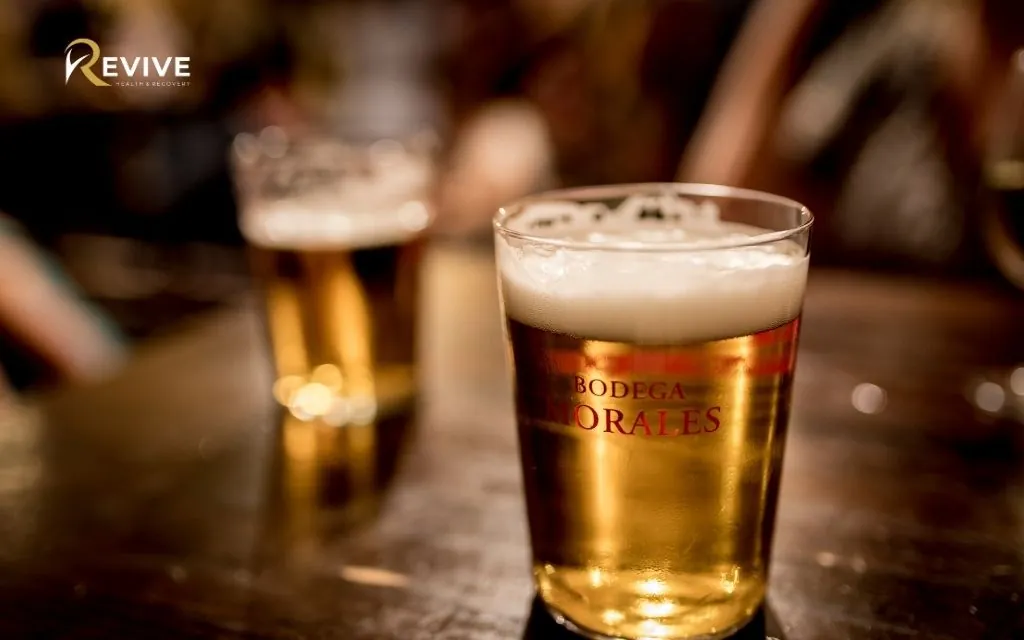Waking up after a night of drinking only to feel overwhelmed by sadness, anxiety, and hopelessness is more common than you think. This phenomenon, scientifically known as alcohol-induced depression or “hangxiety,” affects millions of people and has clear biological explanations.
When alcohol leaves your system, it creates a neurochemical imbalance that disrupts mood-regulating neurotransmitters like serotonin and dopamine. What starts as temporary relief often leads to deeper emotional distress the following day. Understanding this cycle is the first step toward breaking free from post-drinking depression and reclaiming your mental wellness.
If you’re wondering “why do I feel depressed the day after drinking,” you’re not alone. Many people experience these intense emotions without understanding the science behind them. At Revive Health Recovery, we help Denver residents understand and overcome these challenging feelings through evidence-based treatment approaches.
The neuroscience behind post-drinking depression
Your brain operates on a delicate balance of neurotransmitters that regulate mood, sleep, and emotional stability. When you drink alcohol, this balance gets disrupted in ways that create lasting effects beyond the initial buzz.
How alcohol disrupts your brain chemistry
Alcohol acts as a depressant on your central nervous system, but paradoxically, it initially makes many people feel happier and more relaxed. This happens because alcohol triggers the release of dopamine in your brain’s reward center while simultaneously enhancing the effects of GABA, a neurotransmitter that promotes calm feelings.
However, your brain doesn’t like being thrown off balance. As alcohol metabolizes, your system overcorrects by reducing the production of these feel-good chemicals. This leads to serotonin depletion, which directly contributes to feelings of sadness and depression after drinking.

The dopamine crash that follows alcohol consumption is particularly intense. Your brain, having been flooded with artificial pleasure signals, now struggles to produce adequate amounts naturally. This explains why you might feel flat, unmotivated, or deeply sad the morning after drinking.
GABA rebound effect creates another layer of distress. As alcohol leaves your system, your brain produces less GABA while increasing excitatory neurotransmitters. This shift can trigger anxiety spikes and make you feel on edge or panicked.
The timeline of neurochemical recovery
Understanding when these changes occur can help you prepare for and manage post-drinking depression more effectively:
| Time Frame | What Happens | Symptoms |
| 0-6 hours | Your body metabolizes alcohol while neurotransmitter disruption begins | Sleep quality decreases, REM cycles get interrupted |
| 6-24 hours | Peak neurotransmitter disruption occurs | Worst depression after drinking, serotonin and dopamine at lowest points |
| 24-72 hours | Gradual chemical rebalancing takes place | Brain slowly returns to baseline neurotransmitter production |
For support during this challenging period, contact Revive Health Recovery at (303) 268-4655. Our team understands the biological aspects of post-drinking depression and can provide immediate guidance.
Why some people experience hangxiety more than others
Not everyone who drinks experiences severe depression the next day. Several factors determine your individual vulnerability to these effects.
Genetic factors and individual vulnerability
Your genetics play a significant role in how your body processes alcohol and recovers from its effects. People with ALDH2 gene variants metabolize alcohol more slowly, leading to prolonged exposure to toxic byproducts that intensify emotional symptoms.
Family history of depression and anxiety disorders also increases your risk. If mental health conditions run in your family, you may be more susceptible to alcohol-induced mood changes due to underlying neurochemical sensitivities.
Neuroplasticity differences affect how quickly your brain can restore balance after alcohol disruption. Some individuals naturally produce neurotransmitters more efficiently, while others struggle with slower recovery processes.
Environmental and lifestyle contributors
Sleep quality plays a crucial role in post-drinking emotional state. Alcohol disrupts REM sleep patterns, preventing your brain from processing emotions and consolidating memories properly. Poor sleep compounds the neurochemical imbalance, making depression worse.
Dehydration and blood sugar fluctuations amplify mood symptoms. Alcohol is a diuretic that depletes essential electrolytes needed for proper brain function. Low blood sugar levels can trigger anxiety and worsen depressive feelings.
Denver’s high altitude creates a unique amplification effect for hangover symptoms, including depression. At 5,280 feet above sea level, your body becomes dehydrated more quickly and alcohol absorption increases. This combination intensifies both physical and emotional hangover symptoms for Denver residents.

Recognizing the signs of alcohol-induced depression
Identifying post-drinking depression early can help you take appropriate action and seek support when needed.
Physical symptoms
Your body manifests emotional distress through various physical signs. Fatigue often feels more intense than typical tiredness, accompanied by persistent headaches and body aches that seem disproportionate to the amount you drank.
Digestive issues frequently occur alongside mood changes. You might experience nausea, stomach pain, or complete loss of appetite. These symptoms reflect your body’s struggle to restore chemical balance.
Sleep disturbances continue even after the alcohol has left your system. You may find yourself unable to fall back asleep, experiencing restless nights, or waking up frequently with racing thoughts.
Emotional and cognitive symptoms
The emotional impact of post-drinking depression can be overwhelming. Intense sadness and hopelessness may feel similar to clinical depression but typically resolve within 72 hours as your brain chemistry rebalances.
Anxiety and panic-like symptoms often accompany the sadness. You might experience racing heart, sweating, or feelings of impending doom without any identifiable trigger.
Difficulty concentrating and decision-making becomes apparent as your prefrontal cortex struggles with reduced neurotransmitter availability. Simple tasks may feel impossible, and you might have trouble organizing your thoughts.
CONTACT IMMEDIATELY WHEN:
- Depression lasts longer than 72 hours
- You have thoughts of suicide or self-harm
- Drinking frequency is increasing
- Symptoms interfere with daily activities
If these symptoms persist beyond three days or feel unmanageable, reach out to Revive Health Recovery at contact@revivehealthrecovery.com for professional guidance.
The dangerous cycle: self-medication and escalation
Understanding how post-drinking depression can evolve into more serious problems is crucial for early intervention.
When drinking becomes a coping mechanism
Many people discover that alcohol temporarily relieves symptoms of depression or anxiety. This creates a dangerous pattern where drinking becomes the go-to solution for emotional distress, even though it ultimately worsens the very problems it seems to solve.
The kindling effect describes how repeated episodes of alcohol withdrawal sensitize your brain. Each cycle of drinking and recovery becomes more intense, with stronger depressive episodes and longer recovery times. Your nervous system essentially becomes more reactive to alcohol’s effects.
Progression from occasional to regular use often happens gradually. What starts as weekend drinking to unwind can evolve into daily alcohol consumption to manage increasing emotional instability.
Breaking the pattern before it becomes addiction
Early warning signs include drinking more frequently than intended, using alcohol specifically to improve mood, or feeling unable to cope with stress without drinking. Recognizing these patterns early makes intervention more effective.
Professional intervention becomes crucial when you notice these warning signs. Mental health professionals can help you develop healthier coping strategies before drinking becomes a dependency.
Building healthier coping strategies involves learning new ways to manage stress and emotional pain. This might include therapy, mindfulness practices, exercise, or social support systems that don’t involve alcohol.
Evidence-based recovery strategies
Effective recovery from post-drinking depression involves both immediate relief techniques and long-term prevention strategies.
Immediate relief techniques (first 24-48 hours): RECOVERY CHECKLIST
- Hydration and electrolyte restoration – Drink water consistently throughout the day and consider electrolyte supplements
- Nutritional support – Eat foods rich in tryptophan (bananas, eggs, turkey) and leafy greens
- Mindfulness and breathing exercises – Practice deep breathing to activate parasympathetic nervous system
- Avoid caffeine and sugar – These can worsen anxiety and mood swings
- Rest adequately – Allow your brain time to restore neurotransmitter balance
Long-term prevention and mental health support
Cognitive behavioral therapy approaches help you identify triggers and develop healthier thought patterns around alcohol use and emotional management. CBT teaches practical skills for managing both depression and the urge to self-medicate with alcohol.
Lifestyle modifications for mood stability include regular exercise, consistent sleep schedules, and stress management techniques. These changes support your brain’s natural ability to produce mood-stabilizing neurotransmitters.
Building a sustainable support network provides accountability and emotional resources during challenging times. This might include friends, family, support groups, or professional counselors who understand your goals.
When to seek professional help in Denver
Knowing when to reach out for professional support can prevent minor issues from becoming major problems.
Red flags that require immediate attention
Persistent depression lasting beyond 72 hours suggests that your symptoms may involve more than simple alcohol-induced neurotransmitter disruption. This could indicate underlying mental health conditions that need professional treatment.
Suicidal thoughts or self-harm ideation should always be taken seriously. If you experience thoughts of hurting yourself, contact emergency services immediately or call Revive Health Recovery’s 24/7 support line at (303) 268-4655.
Increasing frequency of drinking episodes indicates that alcohol use may be escalating into dependency. Professional intervention can help break this cycle before it becomes more entrenched.

Local mental health resources and treatment options
Outpatient therapy and counseling services provide flexible support that fits your schedule while addressing both mental health and substance use concerns. Revive Health Recovery specializes in dual diagnosis treatment that addresses the complex relationship between alcohol use and depression.
Support groups and peer recovery programs offer community connection with others who understand your experiences. These groups provide accountability and practical strategies from people who have successfully navigated similar challenges.
Integrated mental health and substance abuse treatment addresses both issues simultaneously rather than treating them separately. This approach recognizes that depression and alcohol use often reinforce each other and require coordinated care.
FAQs about question ‘why do i feel depressed the day after drinking’
How long does depression after drinking usually last?
Post-drinking depression typically resolves within 24-72 hours as your brain chemistry rebalances. However, people with genetic vulnerabilities or underlying mental health conditions may experience longer recovery periods. If symptoms persist beyond three days, contact Revive Health Recovery for professional evaluation.
Is hangxiety the same as regular anxiety and depression?
While symptoms may feel similar, hangxiety is chemically induced by alcohol withdrawal and usually temporary. Clinical depression and anxiety are persistent mental health conditions requiring different treatment approaches. Revive Health Recovery can help you distinguish between these conditions and develop appropriate treatment plans.
Can I prevent feeling depressed after drinking without quitting alcohol completely?
Moderation strategies, proper hydration, nutrition, and spacing out drinking occasions can reduce severity. However, complete prevention may require significantly reducing or eliminating alcohol consumption. Our Denver team can help you explore healthy alternatives and coping strategies.
Why do I feel more depressed after drinking in Denver compared to other cities?
Denver’s high altitude can intensify hangover symptoms, including depression, due to increased dehydration, altered oxygen levels, and faster alcohol absorption at elevation. Revive Health Recovery understands these unique regional factors and can provide Denver-specific guidance.
When should I consider getting professional help for post-drinking depression?
Seek help if symptoms persist beyond 72 hours, occur after minimal drinking, interfere with daily functioning, or if you find yourself drinking more frequently to cope with negative emotions. Revive Health Recovery offers immediate consultation and ongoing support.
Why choose Revive Health Recovery for your mental wellness journey
1. Specialized expertise in dual diagnosis treatment – Our team understands the complex relationship between alcohol use and mental health, providing integrated care that addresses both simultaneously.
2. Evidence-based therapeutic approaches – We utilize proven methods like CBT, DBT, and mindfulness-based interventions specifically tailored for alcohol-related mood disorders.
3. Denver-local understanding – As a Colorado-based center, we understand unique regional factors like altitude effects and can provide community-specific resources and support.
4. Flexible outpatient services – Our programs offer intensive support without the disruption of inpatient care, allowing you to maintain your daily responsibilities while receiving treatment.
5. 24/7 accessibility and crisis support – With round-the-clock availability, you’re never alone in your recovery journey, especially during vulnerable post-drinking periods.
Conclusion
Breaking free from the cycle of post-drinking depression requires understanding, support, and professional guidance. At Revive Health Recovery, we’ve helped countless Denver residents reclaim their mental wellness and build healthier relationships with alcohol and their emotions.
You don’t have to face another morning of post-drinking despair alone. Our compassionate Denver team is ready to provide the specialized care you deserve, combining cutting-edge therapeutic approaches with the personal attention that makes all the difference in recovery.
Understanding why you feel depressed the day after drinking is the first step toward lasting change. Your brain’s neurochemical recovery process is complex, but with proper support and evidence-based treatment, you can break free from this challenging cycle.
CONTACT US TODAY
Visit Us: 1427 S Federal Blvd, Denver, CO 80219
Email: contact@revivehealthrecovery.com
Call Now – Available 24/7: (303) 268-4655
Don’t let another morning of post-drinking depression control your life! Take control of your mental health. Your future self will thank you.



